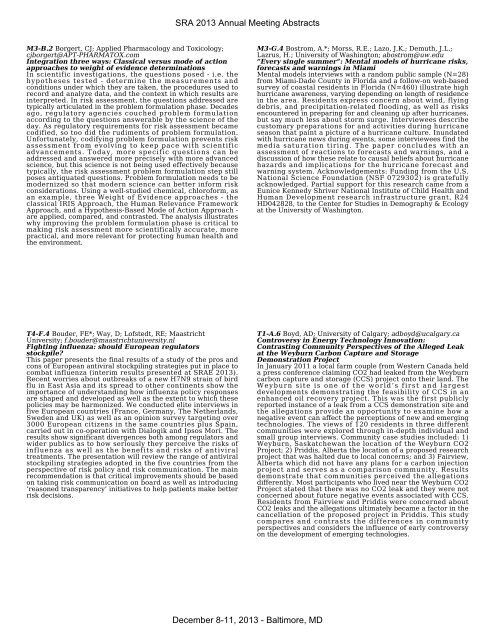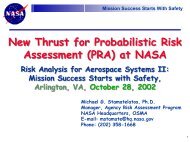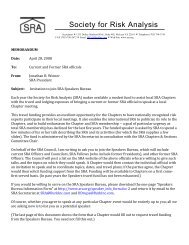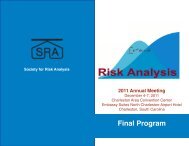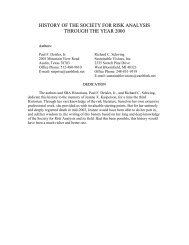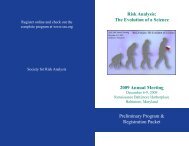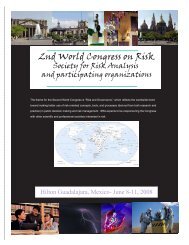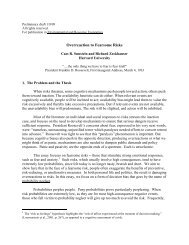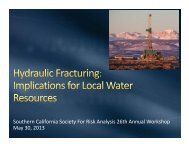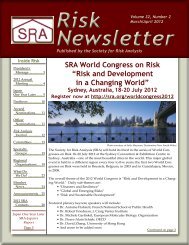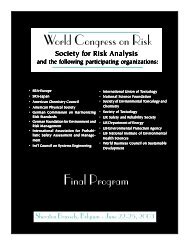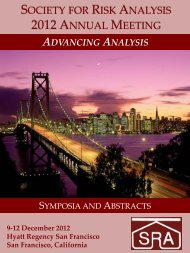Abstracts (PDF file, 1.8MB) - Society for Risk Analysis
Abstracts (PDF file, 1.8MB) - Society for Risk Analysis
Abstracts (PDF file, 1.8MB) - Society for Risk Analysis
You also want an ePaper? Increase the reach of your titles
YUMPU automatically turns print PDFs into web optimized ePapers that Google loves.
SRA 2013 Annual Meeting <strong>Abstracts</strong><br />
M3-B.2 Borgert, CJ; Applied Pharmacology and Toxicology;<br />
cjborgert@APT-PHARMATOX.com<br />
Integration three ways: Classical versus mode of action<br />
approaches to weight of evidence determinations<br />
In scientific investigations, the questions posed - i.e. the<br />
hypotheses tested - determine the measurements and<br />
conditions under which they are taken, the procedures used to<br />
record and analyze data, and the context in which results are<br />
interpreted. In risk assessment, the questions addressed are<br />
typically articulated in the problem <strong>for</strong>mulation phase. Decades<br />
ago, regulatory agencies couched problem <strong>for</strong>mulation<br />
according to the questions answerable by the science of the<br />
day. As regulatory requirements <strong>for</strong> risk assessment became<br />
codified, so too did the rudiments of problem <strong>for</strong>mulation.<br />
Un<strong>for</strong>tunately, codifying problem <strong>for</strong>mulation prevents risk<br />
assessment from evolving to keep pace with scientific<br />
advancements. Today, more specific questions can be<br />
addressed and answered more precisely with more advanced<br />
science, but this science is not being used effectively because<br />
typically, the risk assessment problem <strong>for</strong>mulation step still<br />
poses antiquated questions. Problem <strong>for</strong>mulation needs to be<br />
modernized so that modern science can better in<strong>for</strong>m risk<br />
considerations. Using a well-studied chemical, chloro<strong>for</strong>m, as<br />
an example, three Weight of Evidence approaches - the<br />
classical IRIS Approach, the Human Relevance Framework<br />
Approach, and a Hypothesis-Based Mode of Action Approach -<br />
are applied, compared, and contrasted. The analysis illustrates<br />
why improving the problem <strong>for</strong>mulation phase is critical to<br />
making risk assessment more scientifically accurate, more<br />
practical, and more relevant <strong>for</strong> protecting human health and<br />
the environment.<br />
M3-G.4 Bostrom, A.*; Morss, R.E.; Lazo, J.K.; Demuth, J.L.;<br />
Lazrus, H.; University of Washington; abostrom@uw.edu<br />
“Every single summer”: Mental models of hurricane risks,<br />
<strong>for</strong>ecasts and warnings in Miami<br />
Mental models interviews with a random public sample (N=28)<br />
from Miami-Dade County in Florida and a follow-on web-based<br />
survey of coastal residents in Florida (N=460) illustrate high<br />
hurricane awareness, varying depending on length of residence<br />
in the area. Residents express concern about wind, flying<br />
debris, and precipitation-related flooding, as well as risks<br />
encountered in preparing <strong>for</strong> and cleaning up after hurricanes,<br />
but say much less about storm surge. Interviewees describe<br />
customary preparations <strong>for</strong> and activities during hurricane<br />
season that paint a picture of a hurricane culture. Inundated<br />
with hurricane news during events, some interviewees find the<br />
media saturation tiring. The paper concludes with an<br />
assessment of reactions to <strong>for</strong>ecasts and warnings, and a<br />
discussion of how these relate to causal beliefs about hurricane<br />
hazards and implications <strong>for</strong> the hurricane <strong>for</strong>ecast and<br />
warning system. Acknowledgements: Funding from the U.S.<br />
National Science Foundation (NSF 0729302) is gratefully<br />
acknowledged. Partial support <strong>for</strong> this research came from a<br />
Eunice Kennedy Shriver National Institute of Child Health and<br />
Human Development research infrastructure grant, R24<br />
HD042828, to the Center <strong>for</strong> Studies in Demography & Ecology<br />
at the University of Washington.<br />
T4-F.4 Bouder, FE*; Way, D; Lofstedt, RE; Maastricht<br />
University; f.bouder@maastrichtuniversity.nl<br />
Fighting influenza: should European regulators<br />
stockpile?<br />
This paper presents the final results of a study of the pros and<br />
cons of European antiviral stockpiling strategies put in place to<br />
combat influenza (interim results presented at SRAE 2013).<br />
Recent worries about outbreaks of a new H7N9 strain of bird<br />
flu in East Asia and its spread to other continents show the<br />
importance of understanding how influenza policy responses<br />
are shaped and developed as well as the extent to which these<br />
policies may be harmonized. We conducted elite interviews in<br />
five European countries (France, Germany, The Netherlands,<br />
Sweden and UK) as well as an opinion survey targeting over<br />
3000 European citizens in the same countries plus Spain,<br />
carried out in co-operation with Dialogik and Ipsos Mori. The<br />
results show significant divergences both among regulators and<br />
wider publics as to how seriously they perceive the risks of<br />
influenza as well as the benefits and risks of antiviral<br />
treatments. The presentation will review the range of antiviral<br />
stockpiling strategies adopted in the five countries from the<br />
perspective of risk policy and risk communication. The main<br />
recommendation is that critical improvements should be based<br />
on taking risk communication on board as well as introducing<br />
‘reasoned transparency’ initiatives to help patients make better<br />
risk decisions.<br />
T1-A.6 Boyd, AD; University of Calgary; adboyd@ucalgary.ca<br />
Controversy in Energy Technology Innovation:<br />
Contrasting Community Perspectives of the Alleged Leak<br />
at the Weyburn Carbon Capture and Storage<br />
Demonstration Project<br />
In January 2011 a local farm couple from Western Canada held<br />
a press conference claiming CO2 had leaked from the Weyburn<br />
carbon capture and storage (CCS) project onto their land. The<br />
Weyburn site is one of the world’s first and largest<br />
developments demonstrating the feasibility of CCS in an<br />
enhanced oil recovery project. This was the first publicly<br />
reported instance of a leak from a CCS demonstration site and<br />
the allegations provide an opportunity to examine how a<br />
negative event can affect the perceptions of new and emerging<br />
technologies. The views of 120 residents in three different<br />
communities were explored through in-depth individual and<br />
small group interviews. Community case studies included: 1)<br />
Weyburn, Saskatchewan the location of the Weyburn CO2<br />
Project; 2) Priddis, Alberta the location of a proposed research<br />
project that was halted due to local concerns; and 3) Fairview,<br />
Alberta which did not have any plans <strong>for</strong> a carbon injection<br />
project and serves as a comparison community. Results<br />
demonstrate that communities perceived the allegations<br />
differently. Most participants who lived near the Weyburn CO2<br />
Project stated that there was no CO2 leak and they were not<br />
concerned about future negative events associated with CCS.<br />
Residents from Fairview and Priddis were concerned about<br />
CO2 leaks and the allegations ultimately became a factor in the<br />
cancellation of the proposed project in Priddis. This study<br />
compares and contrasts the differences in community<br />
perspectives and considers the influence of early controversy<br />
on the development of emerging technologies.<br />
December 8-11, 2013 - Baltimore, MD


